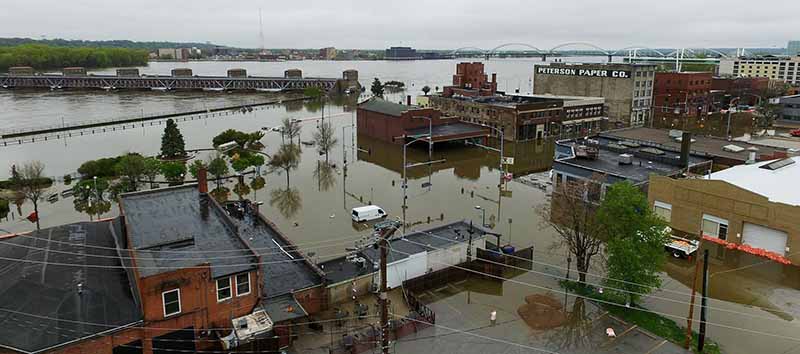CHMS Support Davenport Climate Change Resolution

The Davenport City Council on Wednesday will consider passing a resolution supporting strategies and programs to lower greenhouse gas emissions, reduce the impact of city operations on the environment, and improve air and water quality.
The resolution calls on the city to enact goals to address and mitigate the causes and effects of climate change and environmental degradation in city work plans and operating and capital budges.
"I really feel this is an important thing that identifies environmental issues, climate change, storm water management and the protection of vulnerable communities as an integral part of good government in Davenport," said resolution supporter and 8th Ward Alderwoman Judith Lee.
Several Iowa cities, as well as the Davenport Community School District, have formal policies, plans and actions in place for conserving energy and water, decreasing air pollution and greenhouse gas emissions, and mitigating adverse climate and environmental impacts on residents, businesses and vulnerable communities.
The resolution does not include specific goals or metrics for reducing greenhouse gas emissions, and does not include specific spending proposals to tackle climate change, but rather formally recognizes practices the city currently has underway.
"More it's about the ideology and putting them into practice," City Administrator Corri Spiegel said.
That includes the planned purchase of electric city buses; improved stormwater and floodplain management; the construction of energy-efficient LEED-certified municipal buildings; the capture and conversion of methane into energy at Davenport's Water Pollution Control Plant; LED street and traffic lights; and partnering with Augustana College to collect and benchmark data of city facilities and vehicles for identifying strategies for decreasing energy use and emissions.
"It doesn't necessarily change anything about how we are doing business or how we look at things," Spiegel said. "What is specifically creates are opportunities" to show the city council's support to slowing climate change.
Such a resolution would make Davenport more competitive when applying for state and federal dollars for city projects and initiatives, Spiegel said, especially given the current federal administration.
President Joe Biden has committed to put the country on a path to net-zero carbon emissions by 2050. And Biden's proposed $2.3 trillion infrastructure plan is heavily focused on the build out of clean energy infrastructure as part of a broader effort to curb climate change and create new "green" jobs.
The resolution states the city council "supports staff more effectively competing for grants and funding" aimed at conservation and lowering the city's carbon footprint, as both good stewards of taxpayer funds and the environment.
"I think it adds an opportunity to have the city's voice, from the policymakers on down, be very clear that those are values of the community," Spiegel said.
The city resolution is backed by the Progressive Action for the Common Good, the Diocese of Davenport, the Davenport branch of the NAACP, Unitarian Universalist Congregation of the Quad Cities, Congregation of the Humility of Mary, Nahant Marsh Education Center and Edwards United Church of Christ.
"This action comes at such a critical moment in our planet's history ... as we have a very narrow window of time in which we can still head off the most severe effects of global warming," said Lori McCollum, chairwoman of environmental justice team at the Unitarian Universalist Congregation of the Quad Cities.
Global temperatures could reach an irreversible tipping point in less than a decade, if the world doesn’t act dramatically to reduce the amount of carbon dioxide released into the atmosphere, according to the United Nations Intergovernmental Panel on Climate Change.
"Even if you don't find the science of global warming credible, I'm sure you still want clean air and water, you want energy-efficient buildings, stormwater systems that can withstand increasingly devastating weather events and cost savings for your taxpayers. So this resolution is a win-win for everyone."
McCollum said many studies have shown long-term cost savings through investment in energy-efficient and renewable technologies and practices, which pay for themselves many times over in reduced lifetime operational costs.
"So you're not only being stewards of the Earth, but stewards of the city coffers," she said.
Bishop Thomas Zinkula of the Roman Catholic Diocese of Davenport, in a letter to the city supporting the resolution, noted Pope Francis' 2015 encyclical on climate change and inequality and the "urgency of environmental challenges, which disproportionately affect those who live on the margins of society."
The Scott County Health Department recognized that more than 12% of county residents live in poverty and suffer inequities in access to necessities of healthy living and quality health services, and are therefore economically and socially more vulnerable to the adverse effects of climate change, including flooding, heat waves, extreme cold and severe storms.
"The diocese applauds the willingness of the city council to enter into dialogue on local environmental policy," Zinkula wrote.
This article printed in Quad City Times and written by Brad Ward.